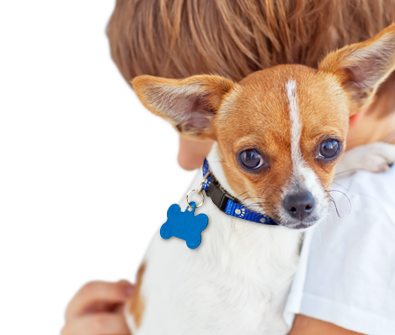5 Things You Might Want to Know About Small Dog Adoption
- Housebreaking: Before you adopt, consider how much time your new family member will spend alone. Remember, a puppy requires constant attention. The key to successful housebreaking is consistency; preventing "accidents" is key. Once a puppy soils the carpeting, it becomes much more difficult to train them out of that behavior. Here's a good rule of thumb to consider: a puppy can hold his bladder just one hour for every month they've been alive. For instance, a 3-month-old puppy will need to empty his bladder every three hours! And yes, that does include the middle of the night! Before you adopt a puppy, ask yourself if you are available to walk your pet several times throughout the day, and if you have the patience and commitment to wake up and take him out several times throughout the night. Of course, before you can walk him at all, you will need to train him to walk on a leash, which is a project in itself.
On the other hand, an adult's bladder is already fully developed. Shelter pooches are most often already housetrained and rescue groups make sure their adults for adoption are housebroken before they go to new homes. You also have the advantage of knowing that your pet is physically able to "hold it" for several hours at a stretch. In most cases, adult pets are by far easier to housebreak than puppies. You can teach an old dog new tricks - Puppy behavior: Sure, puppies are super-cute, but simply put, puppies are adorable, relentless machines of destruction. Even the most well-behaved puppy will destroy shoes, clothing, paper, remote controls, telephones, leashes, dog beds, carpeting…anything and everything. More rambunctious pups have been known to obliterate sofas, car seats, Venetian blinds, electrical cords, door frames…you name it, they can eat it or shred it. And when they're teething, look out! Cute puppies have very sharp teeth, and they are happy to use your hands, feet, nose, hair, etc, as a chew toy. Ouch! Needless to say, a teething puppy and a small child do NOT make good companions! To keep the puppy from hurting himself, and to prevent the destructive behavior from becoming a bad habit, you will need to spend every waking moment supervising his every move. Do you have that kind of time?
Many pets in shelters or with rescue groups are already trained and ready to go! Adults have a much longer attention span than puppies, too, which means they're easier and faster to teach. Adult poochess already have recognizable personality traits, so you'll be able to select one who is great with children. Many rescue groups use foster homes to make sure each pet for adoption is trained to be well-behaved indoors. Although all pets need attention and playtime, an adult pet's needs are far less demanding than a puppy's.
- Personality: With an adult, what you see is what you get. Their personality is already developed, and you'll be able to spot the characteristics you're looking for much more easily than with a puppy. Shelters and rescue groups are able to assess the personality of each pet for adoption, and carefully match you up with the right pet for your lifestyle. When you adopt a puppy, there is a lot more guesswork involved.
- Adult small dog adoption = an instant friend for life: Ask anybody who has adopted, and they'll swear their bond with their rescued pal is as deep as they come. When you open your heart and your home to a pet who needs help, they really do show their appreciation for the rest of their life! Pooches who have been uprooted from their homes, or have had difficult beginnings are likely to bond completely and deeply with their new human caretakers who they view as heroes. Pets who find themselves in the shelter or a rescue group because of a death or other tragedy in their former human family usually go through a mourning period. Once they are adopted, however, they usually want nothing more than to please their new hero---YOU! No matter what circumstances brought them to the shelter or rescue group, most pets for adoption are exceptionally affectionate and attentive pets and extremely loyal companions. But first you have to adopt one!
- Adult small dog adoption = truly saving a life: When you adopt and adult, you are doing the ultimate good deed. Let's face it: a lot of people think they want a puppy, but not everyone is lining up to adopt the great adults! Did you know that every year, approximately 4 million adoptable animals are killed? A staggering 25% of those animals are purebreds, so you can be sure there are a LOT of small purebreds for adoption out there, not to mention all the mixed-breed carry-on size cuties. With such a huge overpopulation problem, buying a puppy from a breeder or pet store sadly contributes to this tragedy. Rescue groups work very, very hard to help find their pets good homes. Rescues are almost always made up of a group of volunteers. They often keep their pets for adoption in their own homes while they assess their health and personalities. If a pet needs basic training, often the rescuer will provide it. If a pet needs medical treatment, many dedicated rescuers pay for it out of their own pocket. These people are incredibly passionate about rescue, and they work tirelessly to make sure every pet finds a home. Nothing is as rewarding to these heroes as a successful adoption!






